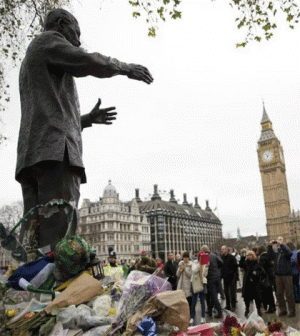- Finding Unshakable Power in a World That Wants to Pull Us ApartPosted 5 months ago
- What could a Donald Trump presidency mean for abortion rights?Posted 5 months ago
- Financial Empowerment: The Game-Changer for Women in Relationships and BeyondPosted 6 months ago
- Mental Health and Wellbeing Tips During and After PregnancyPosted 6 months ago
- Fall Renewal: Step outside your Comfort Zone & Experience Vibrant ChangePosted 6 months ago
- Women Entrepreneurs Need Support SystemsPosted 7 months ago
London mayor urged to honour suffragettes with first female statue on Parliament Square

From trust.org
In this 2013 file photo, crowds gather by a statue of former South African President Nelson Mandela in Parliament Square in central London.
New London Mayor Sadiq Khan said on Tuesday he would be interested in finding a prominent site for a statue to commemorate the approaching centenary of Britain’s suffragette movement which fought to give women the right to vote.
He was responding to a petition, signed by several high-profile figures including Harry Potter author J.K. Rowling and actress Emma Watson, calling for a statue of a woman to be erected in the square outside parliament – an area so far exclusively occupied by men.
The online petition was started by feminist campaigner Caroline Criado-Perez, who led a successful campaign to get British author Jane Austen on the 10-pound banknote from 2017.
“There are 11 statues in Parliament Square. Not a single one is of a woman,” she said in her petition.
“In two years’ time it will be 100 years since those women won their fight and women were first granted the right to vote. They deserve to be remembered. Give them a statue in Parliament Square.”
Other signatories included James Bond actress Naomi Harris, several female members of parliament including the Green Party’s Caroline Lucas and Labour’s Stella Creasy and Abi Morgan, screenwriter for the 2015 British film “Suffragette.”
Khan described himself as a proud feminist during his campaign for the mayoralty which culminated in his election last week to succeed Boris Johnson.
“There are practical issues to consider, such as planning permission and funding, but he would be interested in exploring a suitable high-profile site for a statue, whether this were to be Parliament Square, or another location in central London,” his office said in a statement.
The women’s suffrage movement began in the late 19th century in Britain and finally achieved its full aim in 1928.
Two of its best-known members were Emmeline Pankhurst, who helped found the activist movement that became known as suffragettes, and Emily Davison who was fatally injured at Epsom racecourse during the 1913 Derby under the hooves of King George V’s horse.
Any application to erect a statue would have to be submitted to the planning authority, Westminster Council.
“We will consider any proposals which are made and would consult the public as we do with all planning applications,” a spokesperson said, confirming that it has never received an application for a statue of a woman in Parliament Square.
Statues of famous men in the square include those of Winston Churchill, Mahatma Gandhi and Nelson Mandela.
(Reporting by Nadim Shad, writing by Stephen Addison, editing by Estelle Shirbon)






